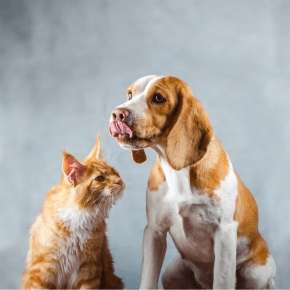Top Dental Hygiene Tips for Pets in Surrey

Oral health is just as important for pets as it is for us. Good dental care can improve your pet's overall wellbeing and keep them comfortable. But how can you tell if your pet's teeth and gums are in great shape? Below, Weybridge's team share what to look for in dogs, cats, rabbits, and guinea pigs.
Signs of good and bad dental hygiene
So, what is going on inside your pet's mouth? Our vets in Weybridge recommend looking at the following dental health factors:
Healthy gums and breath
Our veterinary team recommend one of the first things to check is the condition of your pet's gums. Healthy gums should be pink (or colour-pigmented if that's normal for them), not red or pale, and free from any swelling or bleeding. If your pet has bad breath, this could indicate plaque build-up or other dental issues. While a slight odour can be normal, strong or persistent bad breath is a sign to book an appointment at Weybridge by calling 01932 855856 or booking online.
Clean, strong teeth
Your pet's teeth should be clean and free from visible plaque or tartar. Here's what to look for:
- Dogs and cats: Their teeth should be white with no yellow or brown staining. They should also not be broken, gappy, or misaligned.
- Rabbits and guinea pigs: Their teeth should be neat, without being overgrown. If they are, they may need professional care.
Rabbits and guinea pigs' teeth grow continuously, so it's essential to ensure they wear down naturally through chewing (mainly hay and pet-safe chew toys). Overgrown teeth can lead to serious health problems.
Normal chewing and eating behaviour
A healthy pet should chew their food comfortably. If your dog or cat has trouble chewing, drops food, or avoids eating, our vets in Weybridge advise that this could be a sign of dental discomfort or a more serious issue. Similarly, rabbits and guinea pigs should have no trouble nibbling on hay and vegetables. Difficulty eating can be a sign of misaligned or overgrown teeth, and an emergency if they can't graze throughout the day. Contact our team at Weybridge as soon as possible by calling 01932 855856 if you are noticing these signs.
No excessive drooling
According to our vets, drooling is normal for some pets, but excessive drooling or pawing at the mouth could indicate an issue. If your pet is drooling more than usual or showing discomfort when eating, this could be a sign of dental problems, such as gum disease or tooth infection.
Comfortable behaviour
A pet with healthy teeth and gums will act normally when eating, playing, or being touched around the mouth. If your pet avoids food, acts irritable, or shows signs of pain when chewing, there may be an issue with their oral health.
Keeping their smile healthy
Maintaining good oral health helps prevent more serious health problems, such as heart disease or kidney problems. Regular check-ups at Weybridge and good daily home-checks and care can keep your pet's teeth in top condition.
You can book a dental appointment at Weybridge by calling 01932 855856, or you can book online.
Book a dental check-up now
